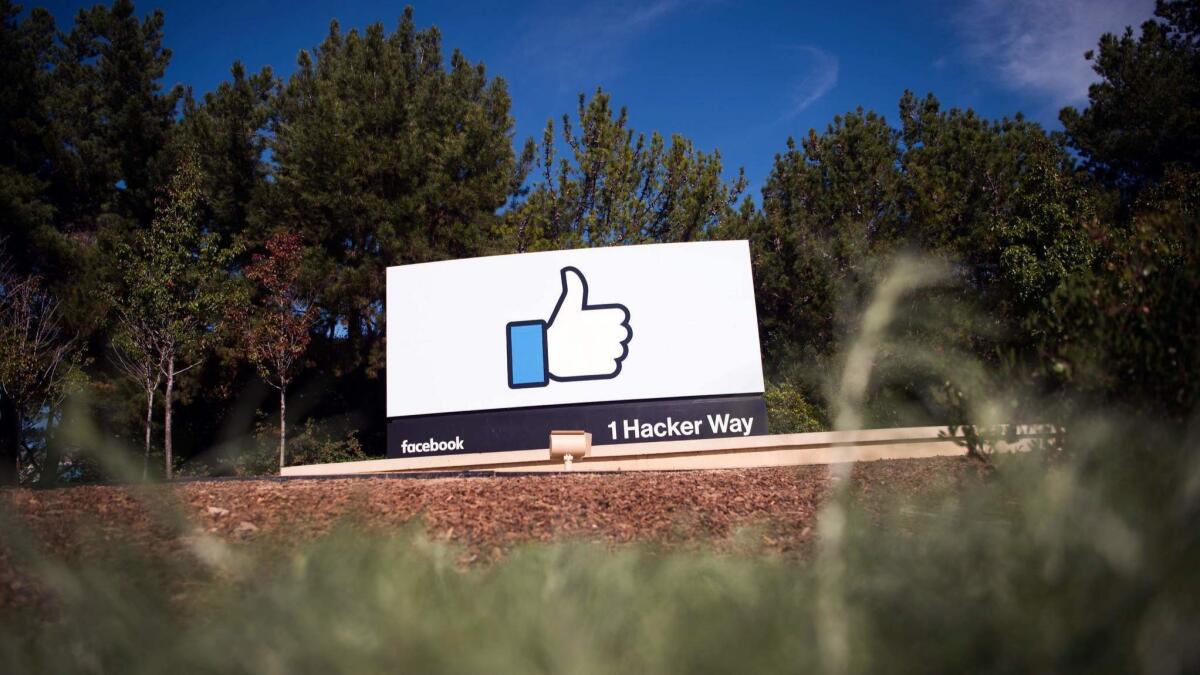Editorial: Facebook has the right to ban extreme voices, but it needs to tread lightly

- Share via
The first thing to be said about Facebook’s decision to ban Louis Farrakhan, Alex Jones and a handful of other controversial figures is that the company is entirely within its rights to decide who will appear on its site. It is also under pressure from governments around the world to silence users (and bots) who encourage violence or lie to the public. That’s why it’s outrageous that President Trump tweeted over the weekend that he is “continuing to monitor the censorship of AMERICAN CITIZENS on social media platforms. This is the United States of America -- and we have what’s known as FREEDOM OF SPEECH!”
Even if this is just another Twitter tantrum that doesn’t lead to any official action, it’s dismaying that the president of the United States is such a constitutional illiterate that he doesn’t realize that the 1st Amendment protects free speech only against infringement by the government, not private entities. In fact, a company like Facebook has every legal right to determine who may participate on its platform and what they may or may not say.
Yet it’s possible to acknowledge Facebook’s right to decide who appears on its site — and its need to do a better job blocking certain types of truly awful content — and still worry that the company might go overboard or act inconsistently in deciding what speech and which speakers are beyond the pale. It may, for instance, be susceptible to pressure to exclude individuals who are neither inciting violence nor spouting racial or religious hatred.
Facebook has become so prominent and pervasive a forum for communication that it should adhere to free-speech principles to the maximum extent possible.
In announcing the bans last week, a Facebook representative said: “We’ve always banned individuals or organizations that promote or engage in violence and hate, regardless of ideology.”
Some the exclusions announced last week might seem like easy calls under that standard. For example, Farrakhan, the leader of the Nation of Islam, has made anti-Semitic statements that any reasonable person would regard as hateful. (He has referred to the “Satanic Jew” and last year said he wasn’t anti-Semitic but “anti-termite.”)
Similarly, it’s hard to defend Jones, author of outrageous conspiracy theories such as the one that the 2012 Sandy Hook shooting, in which 20 children and six adults died, was a hoax. (Jones now says he spun the conspiracy theory as the result of a mental disorder.) If Facebook now plans to police obviously absurd and hurtful conspiracy theories, that may also be appropriate. (It may, however, be a departure for Facebook. Last July, it tweeted: “We just don’t think banning Pages for sharing conspiracy theories or false news is the right way to go.”)
In an exchange with Sen. Ted Cruz (R-Texas) at a Senate hearing last year, Mark Zuckerberg, Facebook’s chief executive, said he considered Facebook a “platform for all ideas,” a laudable aspiration that he didn’t think was incompatible with excluding “hate speech, terrorist content, and nudity, anything that makes people feel unsafe.”
Enter the Fray: First takes on the news of the minute »
This will requiring some complicated balancing. In our view, Facebook should tread lightly, and not err on the side of exclusion, or overreact to organized efforts to silence individuals whose views are controversial, even offensive, but not hateful, inciting or demonstrably untrue. As protests over speakers at some college campuses demonstrate, terms such as “racist” and “hate speech” can be interpreted with amazing elasticity, as can the notion of speech that makes people feel “unsafe.” In some eyes, for example, criticism of university affirmative-action programs as violating the rights of rejected white students would qualify as “racist” speech. Denunciation of the Catholic Church for its sex abuse scandals might be deemed religious “hate speech.” And so on.
Facebook isn’t a public utility or an extension of the government. It isn’t bound by the 1st Amendment. And contrary to some Republicans’ assertions, it isn’t compelled to be a neutral platform in order to be shielded from liability for its users’ posts. But it has become so prominent and pervasive a forum for communication — not just in this country but around the world — that it should adhere to free-speech principles to the maximum extent possible.
Finally, as Zuckerberg himself has admitted, Facebook needs to be vigilant about political bias in deciding which opinions are intolerable. In his Senate testimony, he acknowledged that “Facebook [and] the tech industry are located in Silicon Valley, which is an extremely left-leaning place.” The law may not require the company to apply its standards in an evenhanded manner, but Facebook will do so anyway if it wants to be respected as a “platform for all ideas.”
Follow the Opinion section on Twitter @latimesopinionand Facebook
More to Read
A cure for the common opinion
Get thought-provoking perspectives with our weekly newsletter.
You may occasionally receive promotional content from the Los Angeles Times.










